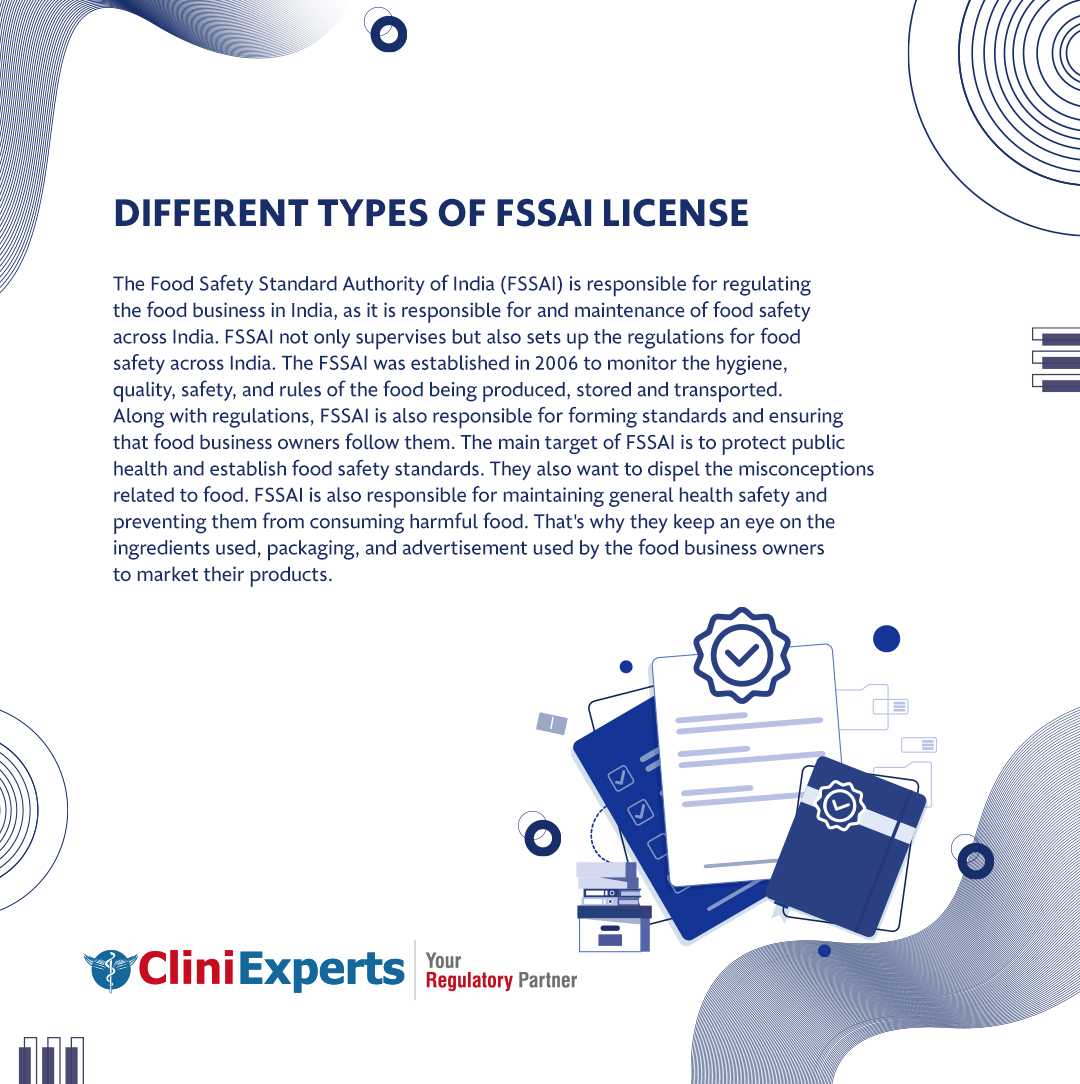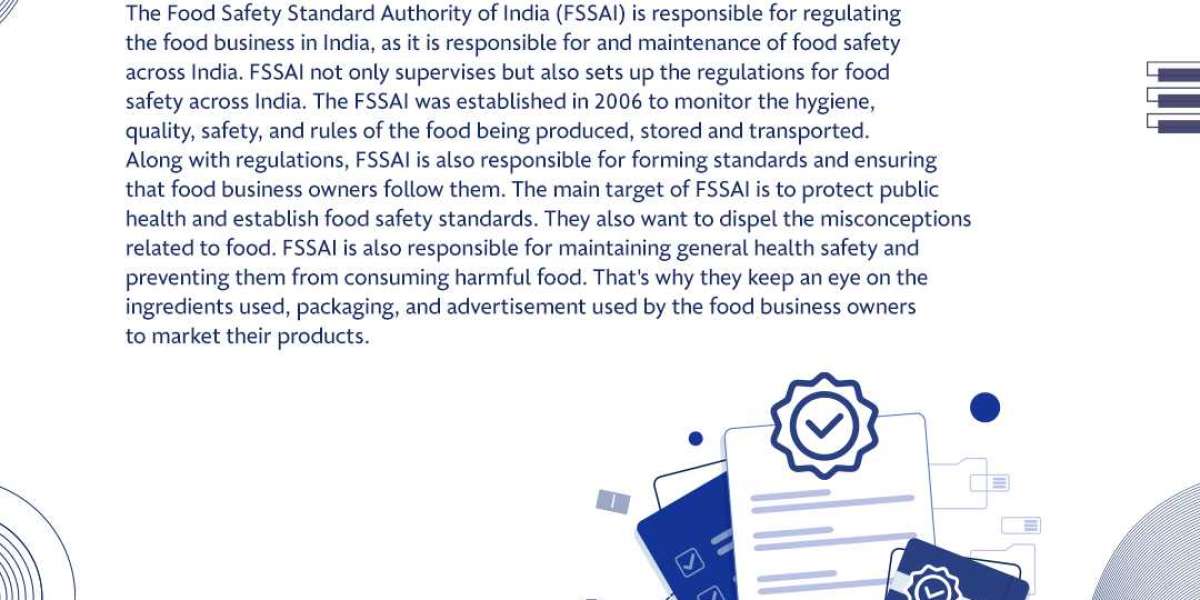The Food Safety Standard Authority of India (FSSAI) is responsible for regulating the food business in India, as it is responsible for and maintenance of food safety across India. FSSAI not only supervises but also sets up the regulations for food safety across India. The FSSAI was established in 2006 to monitor the hygiene, quality, safety, and rules of the food being produced, stored and transported. Along with regulations, FSSAI is also responsible for forming standards and ensuring that food business owners follow them. The main target of FSSAI is to protect public health and establish food safety standards. They also want to dispel the misconceptions related to food. FSSAI is also responsible for maintaining general health safety and preventing them from consuming harmful food. That's why they keep an eye on the ingredients used, packaging, and advertisement used by the food business owners to market their products. Anyone who wants to run a food business in India must have an FSSAI license before starting their business. Otherwise, they have to pay high penalties. Different licenses are available for FSSAI as per the business needs and requirements of the food business. If the food business operator decides to run their business in different locations, they need to have a separate FSSAI license for each facility handling the food. For example, suppose a business operator's headquarters is in Delhi, and they decide to open their facilities in five locations. In that case, they must have an FSSAI license for the headquarters along with five different facilities depending on the turnover.
Types of FSSAI license:
There are three types of FSSAI licenses in India to run a food business which depend on the type, size of the food business, and its total turnover.

Eligibility for FSSAI food license: FSSAI license is the basic requirement to start a food business in India, and any person who is a food business owner must check the eligibility criteria for the license, some of which are mentioned below :
- Any Food Business Owner whose annual turnover is not more than 12 lakhs.
- Minor retailers who are dealing in food products
- A person who produces and sells the food articles all by themselves.
- Food sale was done by the temporary stall holder
- Except for the caterer the person who distributes food at any religious or social gatherings.
- Small-scale industries dealing in the business of food.
- Any food production capacity (not applicable to milk) whose capacity is up to 100 kg/ltr per day.
- Locating, handling, and collecting milk up to 500 ltr per day.
- Slaughtering capacity whose capacity is either 2 larger animals or 10 small animals or 50 poultry birds per day or less.
Let’s discuss the types of FSSAI licenses in detail:
- Basic license:
- Any person whose turnover of food business is less than 12 lakhs must have an FSSAI registration.
- They need to fill the Form A to get the license, as state governments issue the license.
- The license validity is for a minimum of 1 year and a maximum of 5 years.
- State license:
- FSSAI state license is required by any medium-sized food business owner whose business turnover lies between 12 lakhs to 20 crores in most case.
- They need to fill the Form B to obtain the license. The state government issues the license.
- The license validity for a minimum of 1 year and a maximum of 5 years.
- Central license:
- A company that operates the imports or exports in the food business, big manufacturers, who operate in the central government agencies, ports or airports, FBOs dealing in proprietary food, food supplements, E-commerce business etc. must have FSSAI central license to run their business.
- The business turnover applicable is usually more than 20 crores.
- They need to fill the Form B to get the license, as the central government provides.
- If the operational units are in different states, then the company must have FSSAI central license for its headquarter known as the head office license
- The license validity for a minimum of 1 year and a maximum of 5 years.
Cost of different licenses:
Type of license | Cost of registration (per annum) | |
Basic license | Rs 100 + GST | |
State license | Above 1 MT per day production | Rs 2000 to 5000(depending upon the production capacity other criteria) + GST |
Central license | For new application/ Renewal of application | Rs 7500 + GST |
For License modification | Rs 1000 (plus any differential fee) + GST | |
Duplicate license | 10% of the applicable license fee | |
Consequences of non-compliance –
The Food safety officer conducts the audits and inspection of food facilities of food business owners as per the Food Safety and Standard Act 2006. They use a checklist to identify the level of compliance of the food facility and business with the regulations and standards set by the FSSAI. It can be compliance (C), Non-compliance (NC), Partial Compliance (PC), and Not Applicable (NA); if the food safety officer finds any compliance issues, a warning/improvement notice is given to FBO. If the food business owner fails to comply even after that, their license can get canceled, and they have to pay the penalty, anywhere from 1 lakh to 10 lakh, depending on the non-compliance level. After getting the improvement notice, the FBO can appeal to the State Commissioner of Food Safety and, if still unsatisfied the FBO can challenge the decision in the high court.
Conclusion –
If the food business owner carries the FSSAI license as per their business size and turnover, it helps them in the long run. It prevents them not only from the penalties but also allows them to implant trust among consumers. When an FBO has an FSSAI license, it is a sign that the food they handle is of good quality and safe to consume. Also, it takes the business a few steps ahead of those who still need a license. If FBO fails to comply, they need to pay the penalty, and the license gets suspended, causing more financial loss.





